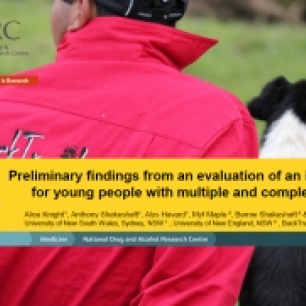This is a copy of the five-minute poster presentation made by Alice Knight at the 2015 NDARC Annual Research Symposium. The poster can be viewed here.
Abstract
Aims: This paper aims to: i) describe the evaluation of a community-based intervention for young people with multiple and complex needs (YPMCN); and ii) report preliminary results from the evaluation.
Methods: In order to evaluate a community-based intervention for YPMCN, a series of steps were undertaken: i) researchers and intervention staff worked together to define the program and develop a program logic; ii) a survey instrument was developed to capture baseline data from participants covering the domains of mental health and wellbeing, education and employment, criminal activity, substance use, and demographic information; iii) the intervention was implemented utilising a multiple baseline design (MBD) in 3 rural communities in NSW; and iv) post-test survey data was collected to determine intervention impact at an individual-level, whilst routinely collected crime data was analysed to determine intervention impact at a community-level.
Results: Baseline survey data and preliminary outcome data, which are currently being analysed (but will be ready by the date of NDARC’s Annual Symposium), will be presented. Initial analyses show a reduction in criminal incidents from pre- to post-intervention at a community-level, as well as improvements in the mental health and wellbeing status of the young people attending the intervention.
Conclusion: YPMCN experience multiple harms simultaneously which makes effective intervention problematic. Preliminary results from an evaluation of a community-based intervention for YPMCN show benefit at both the community-, and individual-level.
Implications of the research: This is the most methodologically rigorous evaluation of an intervention for YPMCN that has been undertaken anywhere in the world to date. It addresses a number of important problems: first, for YPMCN, it improves their outcomes; second, for communities, it reduces social disruption and economic costs; and third, for governments and policy makers, it assists them to invest in relevant and effective interventions for YPMCN.


